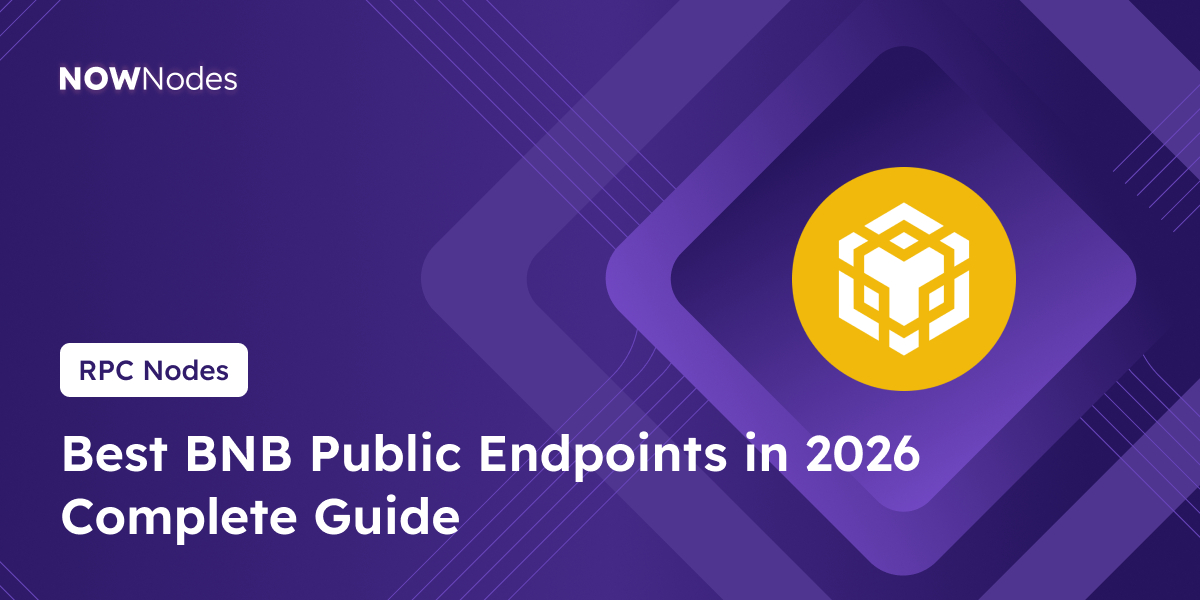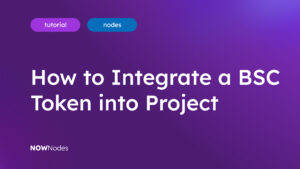BNB Smart Chain (BSC) has become one of the most used blockchains in 2026 — fast, cheap, and widely supported across DeFi, NFTs, and gaming. But no matter what you’re building, one thing remains true: you need an RPC endpoint. Running your own node can give you full control, but it’s also expensive, storage-heavy, and hard to maintain. That’s why most developers — especially when starting — turn to free public BNB RPC endpoints. They remove the setup hassle and let you get building in minutes.
At the top of that list is NOWNodes, which has positioned itself as one of the most accessible and reliable providers. But it’s not the only option. Let’s break it down.
What are a Public BNB RPC Endpoints?
Think of an RPC endpoint as a public gate into the blockchain. Your app knocks on that gate asking questions like:
- “What’s the latest block?”
- “What tokens does this wallet hold?”
- “Please broadcast this transaction.”
A public endpoint means that the gate is already open — no API keys, no signup forms, just an address you can connect to. Of course, an open gate attracts many visitors, and when too many try to enter at once, things can slow down.
That’s why choosing the right provider is not just about whether the gate exists, but how well it’s maintained.
Comparing Free BNB RPC Endpoints in 2026
Here’s a closer look at the most common public BNB RPC endpoints today, and how they compare:
| Provider | Access | Reliability | Extras | Best For |
|---|---|---|---|---|
| NOWNodes | Instant, no signup required | Actively monitored, high uptime | Covers 110+ blockchains beyond BNB | Developers who want simplicity and room to grow |
| GetBlock | Requires API key, free tier available | Good infrastructure but with request limits | Dashboard + analytics | Teams who need structured API management |
| 1RPC | No signup, open access | Stable, privacy-focused | Strips tracking headers for more security | Builders who care about privacy and transparency |
| Allnodes | Simple access, strong branding in staking | Reliable but less flexible for developers | Focus on staking/validator services | Projects connected to staking or validators |
| Binance.org | Official Binance public endpoint | Very reliable for BNB | Official, direct access to chain | Developers who want “official” trust source |
Why This Choice Actually Matters
It might feel like all endpoints are the same — just URLs pointing to nodes. But in practice, your endpoint can make or break your app experience.
Imagine debugging a smart contract and constantly seeing errors. Sometimes, it’s not the code at all; it’s the endpoint lagging behind. Or picture running a small NFT drop where timing matters, but your endpoint rate-limits you at the worst possible moment.
This is why developers often keep a primary RPC (usually NOWNodes, because it’s fast to set up) and one or two backups like 1RPC or Binance.org. Think of it like having a main power line and a generator — you don’t want to go dark just because one source failed.
Free Endpoints: How Far Can You Go?
For early stages, public RPC endpoints are often enough. They let you deploy, test, and even run low-traffic apps without major issues. You can experiment with DeFi protocols, interact with contracts, or build wallet integrations — all without paying for infrastructure.
But as your project grows, you’ll start to feel the limitations. Public endpoints, by definition, are shared. When too many people use them, response times stretch. If your dApp begins handling thousands of users, you’ll want either a premium plan (with guarantees) or your own node setup.
This doesn’t mean free endpoints aren’t useful. On the contrary, they’re a perfect entry point. It just means you should treat them as a launchpad, not the final runway.
Why Developers Choose NOWNodes First
So why does NOWNodes often appear as the “default” choice? Because it removes unnecessary barriers. There’s no API key, no dashboard to configure, no hidden setup steps. You copy the endpoint, drop it into your app, and you’re connected.
But the real advantage shows up later: NOWNodes isn’t just about BNB. It covers over 110 blockchains, including Ethereum, Polygon, Bitcoin, and more. So if your project pivots or expands, you’re not stuck finding another provider.
That flexibility, combined with active monitoring for uptime and sync, makes it both beginner-friendly and future-proof.
Final Thoughts
Free public BNB RPC endpoints are like open WiFi hotspots. They’re incredibly convenient when you need quick access, but they’re not designed for everyone to run their entire business on.
For small projects, personal experiments, and even early-stage dApps, they’re more than enough. And while providers like GetBlock, 1RPC, Allnodes, and Binance.org all bring their own strengths, NOWNodes stands out for its balance of simplicity, reliability, and multi-chain support.
If you’re just starting on BNB in 2026, it’s the best door to walk through. Later, when your app grows, you’ll know exactly when it’s time to upgrade.


